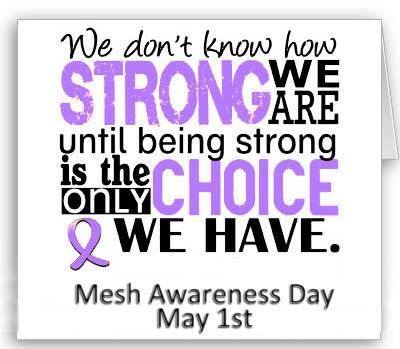 On Wednesday 28th March, one day late, the Senate Inquiry into the “Number of women in Australia who have had transvaginal mesh implants and related matters” handed down is final report. The Senate Inquiry was championed by Derryn Hinch, who called pelvic mesh “the biggest medical scandal for Australian women since thalidomide in the 1950s and 1960s, when kids were born without arms and legs”.
On Wednesday 28th March, one day late, the Senate Inquiry into the “Number of women in Australia who have had transvaginal mesh implants and related matters” handed down is final report. The Senate Inquiry was championed by Derryn Hinch, who called pelvic mesh “the biggest medical scandal for Australian women since thalidomide in the 1950s and 1960s, when kids were born without arms and legs”.
Derryn Hinch had listened to the voices of the Australian Pelvic Mesh Support Group women who campaigned tirelessly to be heard. He was able to get the Senate Inquiry convened, and the hope was that the Senate Inquiry would raise awareness of the permanent, life-altering consequences for some women and call for a ban on its use. However, instead of a ban on the use of mesh, the Inquiry has recommended that mesh only be used “as a last resort”. This Media Release from the Australian Pelvic Mesh Support Group outlines the view of the women across Australia who have suffered permanent, life-altering consequences of pelvic mesh to the Inquiry Report:
There are a few glimmers of hope for mesh-injured women in the report – but the wording used in the recommendations are so weak that it could, if not followed up by robust policy change, give Australian health authorities, specialists and primary carers permission to carry on as usual.
This article summarises the Inquiry Report and highlights the critical importance of always asking the questions you need to provide informed consent. It is simplistic to say that your doctor only has your best interests at heart. There are many other factors at play, as this pelvic mesh scandal has shown.
Complications
Chapter Two of the Inquiry’s Report is a must-read. It documents women’s experiences of complications from mesh implants, compounded by an inability or unwillingness of the medical profession to hear and respond to these reports. At great personal cost, women attended the Senate Inquiry hearings to tell their story:
I presented with mild stress incontinence with exercising and 2 years on I have total and uncontrollable urinary incontinence. I have had multiple hospital admissions, surgeries, invasive investigations and a total loss of my pride as a woman. Name withheld, Submission 458, p. [6].
I dragged myself to work each day and on weekends I was bedridden. I was unable to do normal things like shopping, cooking and housework without debilitating pain and fatigue. My relationship with my family, friends suffered as I could not handle social activities. Not being able to care for my new grandson broke my heart. Surfing was impossible and walking the dogs or doing other light physical exercise was just too painful. Name withheld, Submission 67, p. 1.
To this day, women will still be told “it’s not the mesh” by their GPs and specialists. Even by clinicians working in Mesh Clinics.
Consent
Does it seem peculiar that a Senate Inquiry would spell out the process for ensuring that patients provide informed consent to having a procedure? And yet that is exactly what Recommendation 6 addresses:
The committee recommends that the Australian Commission on Safety and Quality in Health Care prepare guidance material on effective informed consent processes, with a view to ensuring that a dialogue between a medical practitioner and patient should:
- clarify the rationale for the proposed treatment;
- discuss the range of alternate treatment options available and their attendant risks and benefits;
- discuss the likely success and potential complications of the recommended treatment as they relate to the individual patient;
- provide an opportunity for the patient to ask questions; and
- confirm that the individual patient has understood the information discussed.
Here is one consent conversation, which was echoed in many of the submissions and evidence given to the Senate Inquiry:
I was told by my implanting surgeon that I would be back at the gym within 10 days post implant procedure and that I would be like a 16-year-old virgin after the implants. Committee Hansard, 18 September 2017, p. 1.
And many other women simply do not know they have been implanted with mesh. Here is another, common reflection from a woman in a submission to the Inquiry:
How can I have not known a foreign medical device had been implanted in my body without my consent? Name withheld, Submission 528, p. [1]
Reporting complications
There are key barriers to the reporting of complications:
1) it is not mandatory for clinicians to report complications:
…based on my experience and that of many other women in this town, I would not trust surgeons to report complications or gather accurate research data. We all have similar stories of complications, including crippling pain and terrible bowel and bladder symptoms, which were trivialised or denied, and we were told we were the only one with an adverse outcome, that it was our fault that our body had reacted to the mesh. We were abandoned by our surgeon and left to cope as best we could. Kathryn, Committee Hansard, 19 September 2017, p. 4.
2) women are simply not believed when they report complications:
The problem is acknowledging the symptoms in the first place, though. There are a lot of GPs who won’t acknowledge it and there are a lot of gynaecologists who won’t acknowledge it… How can they report it if they’re not acknowledging that your pain and complications are from your mesh? Carolyn Chisholm, Committee Hansard, 25 August 2017, p. 9.
3) it is a complex non-consumer friendly process, requiring the serial number of the mesh implant, which most women won’t have without getting their medical records, which may no longer be available:
Although I am interested in reporting the adverse events I have experienced to the TGA, the TGA Users Medical Device Incident Report is daunting and I simply do not have the detailed information they request for device identification… I have encountered obstacles in trying to obtain my medical records. Name withheld, Submission 477, p. 3.
Medical Device Companies – driving uptake
Prior to my involvement in this issue, I had no idea that medical device companies are the bodies that train clinicians in how to use them. Effectively, they can drive demand for their own product:
The sponsoring companies actively promote medical specialists who utilise their products to referring GPs and company-sponsored educational activities, where one of the aims of that activity is to increase utilisation of those products. Sponsoring companies are also actively involved in the education and provision of training to
medical specialists. Associate Professor Christopher Maher, Committee Hansard, 19 September 2017, p. 30.
What about women who have been injured by mesh?
Every aspect of women’s lives are impacted when there are severe complications. Inability to work means significant economic disadvantage. Sexual dysfunction can mean the end of a relationship. Pain robs life of its quality. Accessing medical assistance is hugely problematic when there is a lack of acceptance that the symptoms are related to mesh, and the lack of actual services. Mesh removal services are very patchy, and some women were advised that mesh removal would mean a colostomy for life. Women have voted with their feet and travelled to the US to access specialist mesh removal care which has not resulted in this awful choice between removal and a functioning bowel. The surgery is significant and the outcomes are uncertain. There is no guarantee the debilitating pain will cease once the mesh is removed.
The final Recommendation tries to address the range of impacts on women:
Recommendation 13: The committee recommends that State and Territory governments continue to work with the Australian Commission on Safety and Quality in Health Care to review the provision of services for the use and removal of transvaginal mesh devices. In particular, the committee recommends that consideration be given to the establishment of:
- information and helplines that women who have received transvaginal mesh implants can contact for advice on the availability of treatment and support services, including financial support programs, in their state;
- specialist counselling programs, to assist women who have sustained injuries following transvaginal mesh procedures;
- specialist multidisciplinary units for the assessment and management of complications associated with transvaginal mesh procedures, comprising:
- comprehensive diagnostic procedures, including relevant diagnostic imaging facilities and expertise;
- specialist pain management expertise; and
- high level expertise in the partial or full removal of transvaginal mesh;
- advice and practical assistance for women who are seeking to access their medical records
The Health Consumers’ Council of WA is aware that many women impacted by mesh implants are seeking full removals, not partial removals. The reality is at present that there are few surgeons, if any, who can perform full removals in Australia. Women have completely lost trust in the clinicians who implanted them in the first place now assuring them that the mesh will be fully removed. Since the Inquiry has finished, we are aware of women who have sought imaging after enduring full removal procedures only to discover there is still mesh inside them.
Western Australia
Women in Western Australia are referred to this page on the Health Consumers Council website for up to date information. This is an area which is rapidly changing. Please contact HCC on 9221 3422 during office hours if further support is required.
Written by Pip Brennan, Executive Director of the Health Consumers’ Council (WA) Inc.






